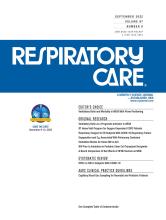Introduction
Prone positioning is known to reduce mortality among patients on mechanical ventilation with moderate-to-severe ARDS.1 When extrapolating data about these patients with ARDS, awake prone positioning is touted as a low-risk intervention that can be performed outside the ICU. Studies show that awake prone positioning is feasible and effective in improving oxygenation in subjects with COVID-19 related pneumonia who are not intubated.2,3 In our recently published multi-center randomized controlled meta-trial, we found that awake prone positioning significantly reduced the composite outcome of intubation or death within 28 days of enrollment for subjects with COVID-19 and with acute hypoxemic respiratory failure supported by high-flow nasal cannula (HFNC) oxygen therapy.4 The early identification of patients at high risk of failure of awake prone positioning may help avoid delayed intubation, which might ultimately improve outcomes. However, predictors of awake prone positioning success remain largely unknown. Thus, we aimed to explore predictors of awake prone positioning success in subjects who were not intubated.
Methods
This was a post hoc analysis of the American data set from the meta-trial.4 Subjects assigned to the awake prone positioning arm and receiving awake prone positioning for ≥30 min were included. Additional data, including subject response to awake prone positioning on the second and third days of enrollment, had been prospectively collected in the American data set only were analyzed and reported. Treatment success was defined as a subject being discharged from the hospital alive without invasive ventilatory support after 28 days of enrollment. In this trial, the subjects were required to be in the prone position until intubation or death or until HFNC was discontinued based on predetermined criteria of  of 92–95% on HFNC flow at 40 L/min and
of 92–95% on HFNC flow at 40 L/min and  of 0.4. The original multi-center randomized controlled trial was registered in clinicaltrials.gov (NCT04325906) and …
of 0.4. The original multi-center randomized controlled trial was registered in clinicaltrials.gov (NCT04325906) and …
Correspondence: Jie Li PhD RRT RRT-NPS RRT-ACCS FAARC, Division of Respiratory Care, Department of Cardiopulmonary Sciences, Rush University. 600 S Paulina St, Suite 765, Chicago, IL 60612. E-mail: Jie_Li{at}rush.edu







